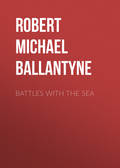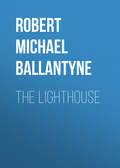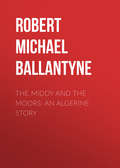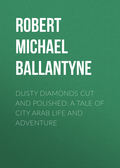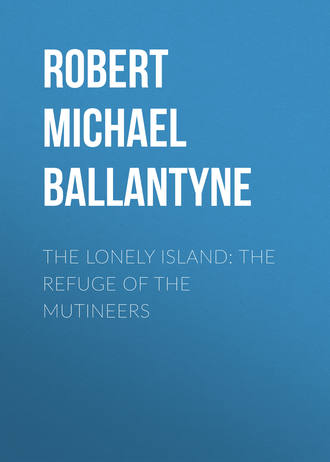
Robert Michael Ballantyne
The Lonely Island: The Refuge of the Mutineers
Chapter Seventeen
The Clouds grow Thicker and Blacker
This glimpse of a stray vessel left a deep impression on the minds of the exiles for many days, and it so far influenced the women that they postponed their scheme of vengeance for some time.
It must not be supposed, however, that all of those women, whom we have described as being so gentle in character, were suddenly transformed into demons. It was only two or three of the more energetic and passionate among them who stirred up the rest, and forced them to fall in with their views. These passionate ones were the widows of the men who had been slain. They not only felt their loss most bitterly, but became almost mad with the despair caused by their forlorn condition, and the apparent hopelessness of deliverance.
The sight of the passing ship had diverted their thoughts for a time, perhaps had infused a little hope; but when the excitement died down they renewed their plots against the men and at last made a desperate attempt to carry them out.
It was on a dark and stormy night. Thunder was rolling in the sky. Lightning flashed among the mountain-peaks. Rain, the first that had descended for many days, fell in fitful showers. It must have seemed to the women either that the elements sympathised with them, or that the extreme darkness was favourable to the execution of their plan, for about midnight one of them rose from her bed, and crept noiselessly to the corner of her hut, where she had seen Quintal deposit a loaded musket the previous day. Possessing herself of the weapon, she went straight to the widow of Fletcher Christian, and wakened her. She rose, somewhat reluctantly, and followed the woman, whose face was concealed in a kerchief of native cloth. The two then went cautiously to another hat, where two of the wives of the murdered Otaheitans awaited them, the one with a long knife, the other with an axe in her hand.
They whispered together for a few seconds. As they did so there came a tremendous crash of thunder, followed by a flash which revealed the dark heads and glistening eyeballs drawn together in a group.
“We had better not try to-night,” said one voice, timidly.
“Faint heart, you may stay behind,” replied another voice, firmly. “Come, let us not delay. They were cruel; we will be cruel too.”
They all crouched down, and seemed to melt into the dark earth. When the next lightning-flash rent the heavens they were gone.
Lying in his bunk, opposite the door of his house, that night, John Adams lay half asleep and half-conscious of the storm outside. As he lay with closed eyes there came a glaring flash of light. It revealed in the open doorway several pallid faces and glistening eyeballs.
“A strange dream,” thought Adams; “stranger still to dream of dreaming.”
The thunder-clap that followed was mingled with a crash, a burst of smoke, and a shriek that caused Adams to leap from his couch as a bullet whistled past his ear. In the succeeding lightning-flash he beheld a woman near him with an uplifted axe, another with a gleaming knife, and Edward Young, who slept in his house that night, in the act of leaping upon her.
Adams was prompt to act on all occasions. He caught the uplifted axe, and wrenching it from her grasp, thrust the woman out of the door.
“There,” he said, quietly, “go thy way, lass. I don’t care to know which of ’ee’s done it. Let the other one go too, Mr Young. It’s not worth while making a work about it.”
The midshipman obeyed, and going to a shelf in a corner, took down a torch made of small nuts strung on a palm-spine, struck a light, and kindled it.
“Poor things,” he said, “I’m sorry for them. They’ve had hard times here.”
“They won’t try it again,” remarked Adams, as he closed the door, and quietly turned again into his sleeping-bunk.
But John Adams was wrong. Foiled though they were on this occasion, and glad though some of them must have been at their failure, there were one or two who could not rest, and who afterwards made another attempt on the lives of the men. This also failed. The first offence had been freely forgiven, but this time it was intimated that if another attempt were made, they should all be put to death. Fortunately, the courage of even the most violent of the women had been exhausted. To the relief of the others they gave up their murderous designs, and settled down into that state of submission which was natural to them.
One might have thought that now, at last, the little colony of Pitcairn had passed its worst days, most of the disturbing elements having been removed; but there was yet one other cloud, the blackest of all, to burst over them. One of the world’s greatest curses was about to be introduced among them. It happened thus:—
One night William McCoy went to his house up on the mountain-side, entered it, and shut and bolted the door. This was an unusual proceeding on his part, and had no connection with the recent attempts at murder made by the women, because he was quite fearless in regard to that, and scoffed at the possibility of being killed by women. He also carefully fastened the window-shutters. He appeared to be somewhat excited, and went about his operations with an air at once of slyness and of mystery.
A small torch or nut-candle which he lighted and set on a bracket on the wall gave out a faint flickering light, which barely rendered darkness visible, and from its position threw parts of the chamber into deepest gloom. It looked not unlike what we suppose would be the laboratory of an alchemist of the olden time, and McCoy himself, with his eager yet frowning visage, a native-made hat slouched over his brows, and a piece of native cloth thrown over his shoulders like a plaid, was no bad representative of an old doctor toiling for the secrets that turn base metal into gold, and old age into youth—secrets, by the way, which have been lying open to man’s hand for centuries in the Word of God.
Taking down from a shelf a large kettle which had formed part of the furniture of the Bounty, and a twisted metal pipe derived from the same source, he fitted them up on a species of stove or oven made of clay. The darkness of the place rendered his movements not very obvious; but he appeared to put something into the kettle, and fill it with water. Then he put charcoal into the oven, kindled it, and blew it laboriously with his mouth until it became red-hot. This flameless fire did not tend much to enlighten surrounding objects; it merely added to them a lurid tinge of red. The operator’s face, being close in front of the fire as he blew, seemed almost as hot as the glowing coals.
With patient watchfulness he sat there crouching over the fire for several hours, occasionally blowing it up or adding more fuel.
As the experiment went on, McCoy’s eyes seemed to dilate with expectation, and his breathing quickened. After a time he rose and lifted a bottle out of a tub of water near the stove. The bottle was attached to one end of the twisted tube, which was connected with the kettle on the fire. Detaching it therefrom, he raised it quickly to the light. Then he put it to his nose and smelt it. As he did so his face lit up with an expression of delight. Taking down from a shelf a cocoa-nut cup, he poured into it some sparkling liquid from the bottle. It is a question which at that moment sparkled most, McCoy’s eyes or the liquid.
He sipped a little, and his rough visage broke into a beaming smile. He drank it all, and then he smacked his lips and laughed—not quite a joyous laugh, but a wild, fierce, triumphant laugh, such as one might imagine would issue from the panting lips of some stout victor of the olden time as he clutched a much-coveted prize, after slaying some half-dozen enemies.
“Ha ha! I’ve got it at last!” he cried aloud, smacking his lips again.
And so he had. Long and earnestly had he laboured to make use of a fatal piece of knowledge which he possessed. Among the hills of Scotland McCoy had learned the art of making ardent spirits. After many failures, he had on this night made a successful attempt with the ti-root, which grew in abundance on Pitcairn. The spirit was at last produced. As the liquid ran burning down his throat, the memory of a passion which he had not felt for years came back upon him with overwhelming force. In his new-born ecstasy he uttered a wild cheer, and filling more spirit into the cup, quaffed it again.
“Splendid!” he cried, “first-rate. Hurrah!”
A tremendous knocking at the door checked him, and arrested his hand as he was about to fill another cup.
“Who’s that?” he demanded, angrily.
“Open the door an’ you’ll see.”
The voice was that of Matthew Quintal. McCoy let him in at once.
“See here,” he cried, eagerly, holding up the bottle with a leer, “I’ve got it at last!”
“So any deaf man might have found out by the way you’ve bin shoutin’ it. Why didn’t you open sooner?”
“Never heard you, Matt. Was too much engaged with my new friend, I suppose. Come, I’ll introdooce him to you.”
“Look alive, then,” growled Quintal, impatiently, for he seemed to have smelt the spirit, as the warhorse is said to smell the battle from afar. “Give us hold o’ the cup and fill up; fill up, I say, to the brim. None o’ your half measures for me.”
He took a mouthful, rolled it round and round with his tongue once or twice, and swallowed it.
“Heh, that’s it once more! Come, here’s your health, McCoy! We’ll be better friends than ever now; good luck to ’ee.”
McCoy thought that there was room for improvement in their friendship, but said nothing, as he watched his comrade pour the fiery liquid slowly down his throat, as if he wished to prolong the sensation.
“Another,” he said, holding out the cup.
“No, no; drink fair, Matt Quintal; wotever you do, drink fair. It’s my turn now.”
“Your turn?” retorted Quintal, fiercely; “why, you’ve bin swillin’ away for half-an-hour before I came.”
“No, Matt, no; honour bright. I’d only just begun. But come, we won’t quarrel over it. Here’s the other half o’ the nut, so we’ll drink together. Now, hold steady.”
“More need for me to give you that advice; you shake the bottle as if you’d got the ague. If you spill a drop, now, I’ll—I’ll flatten your big nose on your ugly face.”
Not in the least hurt by such uncomplimentary threats, McCoy smiled as he filled the cup held by his comrade. The spirit was beginning to tell on him, and the smile was of that imbecile character which denotes perfect self-satisfaction and good-will. Having poured the remainder into his own cup, he refixed the bottle to the tube of the “still,” and while more of the liquid was being extracted, the cronies sat down on low stools before the stove, to spend a pleasant evening in poisoning themselves!
It may be interesting and instructive, though somewhat sad, to trace the steps by which those two men, formed originally in God’s image, reduced themselves, of their own free will, to a level much lower than that of the brutes.
“Doesn’t the taste of it bring back old times?” said McCoy, holding his cup to the light as he might have held up a transparent glass.
“Ay,” assented Quintal, gradually becoming amiable, “the good old times before that fool Fletcher Christian indooced us to jine him. Here’s to ’ee, lad, once more.”
“Why, when I think o’ the jolly times I’ve had at the Blue Boar of Plymouth,” said McCoy, “or at the Swan wi’ the two throttles, in—in—I forget where, I feel—I feel—like—like—here’s your health again, Matt Quintal. Give us your flipper, man. You’re not a bad feller, if you wasn’t given to grumpin’ so much.”
Quintal’s amiability, even when roused to excess by drink, was easily dissipated. The free remarks of his comrade did not tend to increase it, but he said nothing, and refreshed himself with another sip.
“I really do think,” continued McCoy, looking at his companion with an intensity of feeling which is not describable, “I really do think that—that—when I think o’ that Blue Boar, I could a’most become poetical.”
“If you did,” growled Quintal, “you would not be the first that had become a big fool on a worse subjec’.”
“I shay, Matt Quintal,” returned the other, who was beginning to talk rather thickly, so powerful was the effect of the liquor on his unaccustomed nerves; “I shay, ole feller, you used to sing well once. Come g–give us a stave now.”
“Bah!” was Quintal’s reply, with a look of undisguised contempt.
“Jus-so. ’Xactly my opinion about it. Well, as you won’t sing, I’ll give you a ditty myself.”
Hereupon McCoy struck up a song, which, being deficient in taste, while its execution was defective as well as tuneless, did not seem to produce much effect on Quintal. He bore it with equanimity, until McCoy came to a note so far beyond his powers that he broke into a shriek.
“Come, get some more drink,” growled his comrade, pointing to the still; “it must be ready by this time.”
“Shum more drink!” exclaimed McCoy, with a look of indignant surprise. Then, sliding into a smile of imbecile good-humour, “You shl-’ave-it, my boy, you shl-’ave-it.”
He unfixed the bottle with an unsteady hand, and winking with dreadful solemnity, filled up his companion’s cup. Then he filled his own, and sat down to resume his song. But Quintal could stand no more of it; he ordered his comrade to “stop his noise.”
“Shtop my noise!” exclaimed McCoy, with a look of lofty disdain.
“Yes, stop it, an’ let’s talk.”
“Well, I’m w–willin’ t’ talk,” returned McCoy, after a grave and thoughtful pause.
They chose politics as a light, agreeable subject of conversation.
“Now, you see, ’s my ’pinion, Matt, that them coves up’t th’ Admiralty don’t know no more how to guv’n this country than they knows how to work a Turk’s head on a man-rope.”
“P’r’aps not,” replied Quintal, with a look of wise solemnity.
“Nor’-a-bit—on it,” continued McCoy, becoming earnest. “An’ wot on earth’s the use o’ the Lords an’ Commons an’ War Office? W’y don’t they slump ’em all together into one ’ouse, an’ get the Archbishop o’ Cantingbury to bless ’em all, right off, same as the Pope does. That’s w’ere it is. D’ye see? That’s w’ere the shoe pinches.”
“Ah, an’ what would you make o’ the King?” demanded Quintal, with an argumentative frown.
“The King, eh?” said McCoy, bringing his fuddled mind to bear on this royal difficulty; “the King, eh? Why, I’d—I’d make lop-scouse o’ the King.”
“Come, that’s treason. You shan’t speak treason in my company, Bill McCoy. I’m a man-o’-war’s man. It won’t do to shove treason in the face of a mar-o’-wa-a-r. If I am a mutineer, w’at o’ that? I’ll let no other man haul down my colours. So don’t go shovin’ treason at me, Bill McCoy.”
“I’ll shove treason w’erever I please,” said McCoy, fiercely.
“No you shan’t.”
“Yes I shall.”
From this point the conversation became very contradictory in tone, then recriminative, and after that personally abusive. At last Quintal, losing temper, threw the remains of his last cup of spirits in his friend’s face. McCoy at once hit Quintal on the nose. He returned wildly on the eye, and jumping up, the two grappled in fierce anger.
They were both powerful men, whose natural tendency to personal violence towards each other had, up to this time, been restrained by prudence; but now that the great destroyer of sense and sanity was once again coursing through their veins, there was nothing to check them. All the grudges and bitternesses of the past few years seemed to have been revived and concentrated on that night, and they struggled about the little room with the fury of madmen, striking out savagely, but with comparatively little effect, because of excessive passion, coupled with intoxication, clutching and tugging at each other’s whiskers and hair, and cursing with dreadful sincerity.
There was little furniture in the room, but what there was they smashed in pieces. Quintal flung McCoy on the table, and jumping on the top of him, broke it down. The other managed to get on his legs again, clutched Quintal by the throat, and thrust him backward with such violence that he went crashing against the little window-shutters, split them up, and drove them out. In one of their wildest bursts they both fell into the fireplace, overturned the still, and scattered the fire. Fortunately, the embers were nearly out by this time. Tumbling over the stools and wreck, these men—who had begun the evening as friends, continued it as fools, and ended it as fiends—fell side by side into one of the sleeping-bunks, the bottom of which was driven down by the shock as they sank exhausted amid the wreck, foaming with passion, and covered with blood. This was the climax; they fell into a state of partial insensibility, which degenerated at last into a deep lethargic slumber.
Hitherto the quarrels and fights that had so disturbed the peace of Pitcairn, and darkened her moral sky, had been at least intelligently founded on hatred or revenge, with a definite object and murderous end in view. Now, for the first time, a furious battle had been fought for nothing, with no object to be gained, and no end in view; with besotted idiots for the champions, and with strong drink for the cause.
Chapter Eighteen
Aquatic Amusements
Now, it must not be supposed that the wives and widows of these mutineers gave themselves up to moping or sadness after the failure of their wild attempt to make their condition worse by slaying all the men. By no means. By degrees they recovered the natural tone of their mild yet hearty dispositions, and at last, we presume, came to wonder that they had ever been so mad or so bad.
Neither must it be imagined that these women were condemned to be the laborious drudges who are fitly described as “hewers of wood and drawers of water.” They did indeed draw a good deal of water in the course of each day, but they spent much time also in making the tapa cloth with which they repaired the worn-out clothes of their husbands, or fabricated petticoats for themselves and such of the children as had grown old enough to require such garments. But besides these occupations, they spent a portion of their time in prattling gossip, which, whatever the subject might be, was always accompanied with a great deal of merriment and hearty laughter. They also spent no small portion of their time in the sea, for bathing was one of the favourite amusements of the Pitcairners, young and old.
Coming up one day to Susannah, the wife of Edward Young, Thursday October Christian begged that she would go with him and bathe.
Susannah was engaged in making the native cloth at the time, and laid down her mallet with a look of indecision. It may be remarked here that a mallet is used in the making of this cloth, which is not woven, but beaten out from a state of pulp; it is, in fact, rather a species of tough paper than cloth, and is produced from the bark of the paper mulberry.
“I’s got to finish dis bit of cloth to-day, Toc,” said Susannah, in broken English, for she knew that Master Thursday October preferred that tongue to Otaheitan, though he could speak both, “an’ it’s gettin’ late.”
“Oh, what a pity!” said TOC, with a look of mild disappointment.
Now Susannah was by far the youngest and most girlish among the Otaheitan women, and could not resist an appeal to her feelings even when uttered only by the eyes. Besides, little Toc was a great favourite with her. She therefore burst into a merry laugh, gently pulled Thursday’s nose, and said, “Well, come along; but we’ll git some o’ the others for go too, an’ have some fun. You go klect de jumpers. Me git de womans.” Susannah referred to the older children by the term “Jumpers.”
Highly pleased, the urchin started off at once. He found one of the jumpers, namely, Otaheitan Sally, nursing Polly Young, while she delivered an oracular discourse to Charlie Christian, who sat at her feet, meekly receiving and believing the most outrageous nonsense that ever was heard. It is but just to Sally, however, to say that she gave her information in all good faith, having been previously instructed by John Adams, whose desire for the good of the young people was at that period stronger than his love of truth. Wishing to keep their minds as long as possible ignorant of the outer world, he had told them that ships came out of a hole in the clouds on the horizon.
“Yes, Charlie, it’s quite true; father Adams says so. They comes out of a hole on the horizon.”
Charlie’s huge eyes gazed in perplexity from his instructor’s face to the horizon, as if he expected to behold a ship emerging from a hole then and there. Then, turning to Sally again with a simple look, he asked—
“But why does sips come out of holes on de ’rizon?”
Sally was silenced. She was not the first knowing one who had been silenced by a child.
Little Daniel McCoy came up at the moment. Having passed the “staggering” period of life, he no longer walked the earth in a state of nudity, but was decorated with a pair of very short tapa trousers, cut in imitation of seafaring ducks, but reaching only to the knees. He also wore a little shirt.
“Me kin tell why ships come out ob de hole in de horizon,” he said, with a twinkle in his eyes; “just for notin’ else dan to turn about an’ go back into de hole again.”
“Nonsense, Dan’l!” cried Sally, with a laugh.
“Nonsense!” repeated Dan, with an injured look. “Didn’t you saw’d it happen jus’ t’other day?”
“Well, I did saw the ship go farer an’ farer away, an’ vanish,” admitted Sall; “but he didn’t go into a hole that time.”
“Pooh!” ejaculated little Dan, “dat’s ’cause de hole was too far away to be seen.”
Further discussion of the subject was prevented by the arrival of Thursday.
“Well, Toc, you’s in a hurry to-day,” said little Dan, with a look of innocent insolence.
“We’re all to go an’ bathe, child’n,” cried Thursday, with a look of delight; “Susannah’s goin’, an’ all the ’oomans, an’ she send me for you.”
“Hurrah!” shouted Dan and Sally.
“Goin’ to bave,” cried Charlie Christian to Lizzie Mills, who was attracted by the cheering, which also brought up Matt Quintal, who led his little sister Sarah by the hand. Sarah was yet a staggerer, and so was Dinah Adams, also Mary Christian; Polly Young and John Mills had not yet attained even to the staggering period—they were only what little Dan McCoy called sprawlers.
Before many minutes had elapsed, the whole colony of women, jumpers, staggerers, and sprawlers, were assembled on the beach at Bounty Bay.
It could scarcely be said that the women undressed—they merely threw off the light scarf or bodice that covered their shoulders, but kept on the short skirts, which were no impediment to their graceful movements in the water. The jumpers, of course, were only too glad of the excuse to get out of their very meagre allowance of clothing, and the rest were, so to speak, naturally ready for the plunge.
It was a splendid forenoon. There was not a zephyr to ruffle the calm breast of the Pacific, nevertheless the gentle undulation of that mighty bosom sent wave after wave like green liquid walls into the bay in ceaseless regularity. These, toppling over, and breaking, and coming in with a succession of magnificent roars, finally hissed in harmless foam on the shingly beach.
“Now, T’ursday,” said Mrs Adams, “you stop here an’ take care o’ de sprawlers.”
Adams’s helpmate was the oldest of the women, and defective in vision. Her commands were law. Thursday October would as soon have thought of disobeying Adams himself as his wife. It was not in his nature, despite its goodness, to help feeling disappointed at being left in charge of the little ones. However, he made up his mind at once to the sacrifice.
“Never mind, Toc,” said Young’s wife, with a bright smile, “I’ll stay an’ keep you company.”
This was ample compensation to Thursday. He immediately flung himself into the shallow surf, and turning his face to the land, held out his arms and dared the little ones to come to him. Two of them instantly accepted the challenge, crept down to the water, and were beaten back by the next rush of foam. But they were caught up and held aloft with a shout of glee by Susannah.
Meanwhile, the women advanced into the deep surf with the small children on their shoulders, while the others, being able to look after themselves, followed, panting with excitement for although able to swim like corks they found it extremely difficult to do battle with the rushing water.
Deeper and deeper the foremost women went, until they neared the unbroken glassy billows.
“I’ll go at de nixt,” muttered Mrs Adams to Mary Christian, who was on her back, clutching tight round her neck.
The “nixt” was a liquid wall that came rolling grandly in with ever-increasing force and volume, until it hovered to its fall almost over the heads of the daring women. Mrs Adams, Mainmast, and Mills’s widow, who were the foremost of the group, bent their heads forward, and with a graceful but vigorous plunge, sprang straight into the wall of water and went right through it. The others, though a moment later, were quite in time. The children also, uttering wild screams in varied keys, faced the billow gallantly, and pierced it like needles. Another moment, and they were all safe in deep water on the seaward side, while the wave went thundering to the shore in a tumultuous wilderness of foam, and spent its weakened force among the babies.
The moment the women were safe beyond the rolling influence of these great waves, in the calm sea beyond, they threw the staggerers from their shoulders and let them try their own unaided powers, while the jumpers swam and floated around to watch the result.
These wonderful infants disported themselves variously in the sea. Mary Christian wobbled about easily, as if too fat to sink, and Bessy Mills supported herself bravely, being much encouraged by the presence and the cheering remarks of that humorous imp Dan McCoy. But Charlie Christian showed symptoms of alarm, and losing heart after a few moments, threw up his fat little arms and sank. Like the swooping eagle, his mother plunged forward, placed a hand under him, and lifted him on her shoulders, where he recovered equanimity in a few minutes, and soon wanted to be again sent afloat. When this had gone on for a little time, the women reshouldered their babies and swam boldly out to sea, followed at various distances by the youngsters. Of these latter, Sall of Otaheite was by far the best. She easily outstripped the other children, and could almost keep pace with the women.
Meanwhile Thursday October Christian and Susannah Young performed amazing feats with the infants in the shallow water on the beach. Sarah Quintal and Johnny Mills gave them some trouble, having a strong disposition to explore places beyond their depth; but Dinah Adams and Polly Young were as good as gold, spluttering towards their guardians when called, and showing no tendency to do anything of their own immediate free will, except sit on the sand and let the foam rush round and over them like soap-suds.
Now, it is well-known that every now and then there are waves of the sea which seem to have been born on a gigantic scale, and which, emerging somewhere from the great deep, come to shore with a grander roar and a higher rush than ordinary waves.
One such roller came in while no one was on the look-out for it. Its deep-toned roar first apprised Susannah of its approach, but before she could run to the rescue its white crest was careering up the beach in magnificent style. It caught the infants, each sitting with a look of innocent surprise on the sand. It turned them head over heels, and swept them up the shingly shore. It tumbled Susannah herself over in its might, and swept Thursday October fairly off his legs. Having terminated its career thus playfully, the big wave retired, carrying four babies in its embrace. But Susannah and Thursday had regained their footing and their presence of mind. With a brave and, for him, a rapid spring, Thursday caught little Sarah and Dinah as they were rolling helpless down the strand, the one by an arm, the other by a leg, and held on. At the same instant Susannah sprang forward and grasped Jack Mills by the hair of the head, but poor Polly Young was beyond her reach. Little Polly was the smallest, the neatest, and the dearest of the sprawling band. She was rolling to her doom. The case was desperate. In this emergency Susannah suddenly hurled Jack Mills at Thursday. The poor boy had to drop the other two in order to catch the flying Jack, but the other two, sliding down his body, held each to a Thursday October leg like limpets. The result was that the four remained firm and safe, while Susannah leaped into the surf and rescued little Poll.
It all happened so quickly that the actors had scarcely time to think. Having reached the dry land, they looked seaward, and there saw their more practised companions about to come in on the top of a wave. For a few seconds their heads were seen bobbing now on the top, now between the hollows of the waves. Then they were seen on a towering snowy crest which was just about to fall. On the summit of the roaring wave, as if on a snowy mountain, they came rushing on with railway speed. To an unpractised eye destruction among the rocks was their doom. But they had taken good aim, and came careering to the sandy patch where the little ones sprawled. In another moment they stood safe and sound upon the land.
This was but an everyday feat of the Pitcairners, who went up to their village chatting merrily, and thinking nothing more about the adventure than that it was capital fun.



